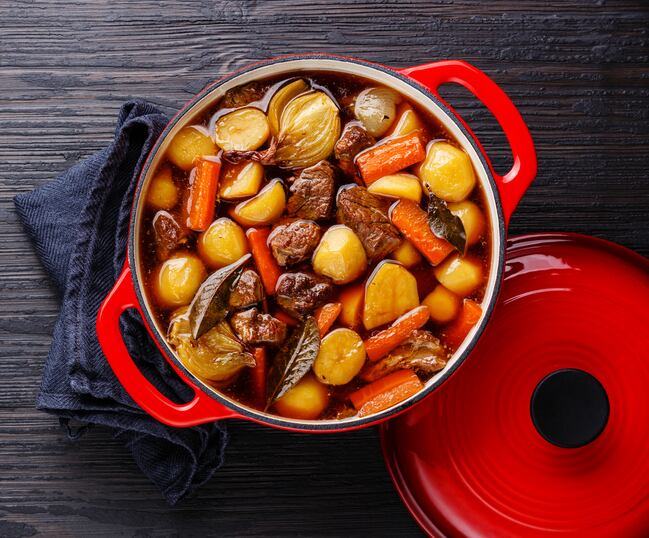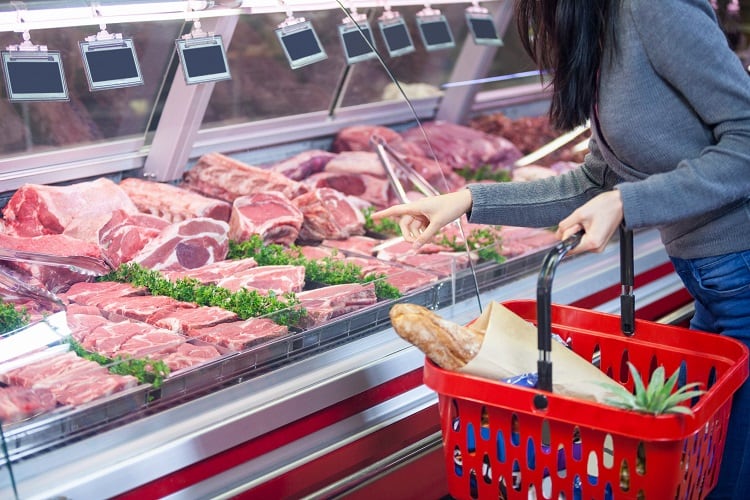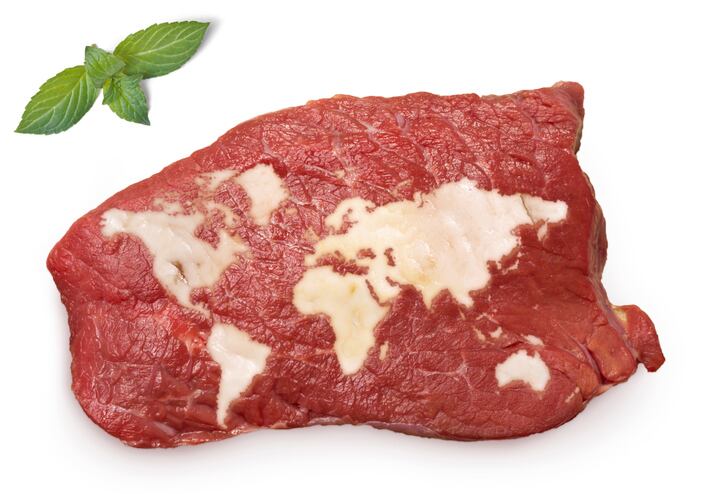Environmental campaigners at Greenpeace are pushing for a massive 71% cut in the amount of meat we eat in Europe over the next ten years. They want to see an average of ‘no more’ than 460 grams of meat leaving European slaughterhouses for citizens' plates by 2030 – and this figure should reduce to 300 grams by 2050, the campaigners argued. Currently, the EU average stands at 1.58 kilograms per person, per week.
Given that not all meat is ultimately sold or eaten, Greenpeace suggested the actual amount people eat would likely need to drop to less than 460 grams a week – less than the equivalent of three burgers.
This shift is pretty massive. But Greenpeace insists that nothing less will be enough to tackle ‘farming’s contribution to the climate breakdown’.
“The science is overwhelming at this stage – overconsumption of meat and dairy is wrecking forests, crushing nature and heating the planet,” Greenpeace EU agriculture and forest campaigner Sini Eräjää said.
The calculation of a reduction of global meat consumption to 24kg per person per year by 2030, and then further to 16kg per person per year by 2050, is based on levels that scientists say would ensure food security, while keeping global heating below 1.5°C, they stated.
The campaign group notes that research published in The Lancet has recommended people eat no more than 300 grams of meat a week as part of a balanced, sustainable diet.
‘It’s time to talk about reducing meat’
Greenpeace stressed that Europeans consume around twice as much meat as the global average, and almost three times as much dairy. Spain has the highest per capita meat consumption in the EU at over 100kg per person per year, requiring a 76% reduction by 2030. Bulgaria has the lowest consumption at 58kg per person annually, requiring a 59% drop by 2030.
The organisation is calling on the European Commission to recognise the environmental impact of meat and dairy ‘overconsumption’. Greenpeace wants reduction targets written into the EC’s upcoming ‘Farm to Fork’ food strategy, which is due to be published later this month (25 March).
FAO data on animal agriculture & GHG emissions
- Emissions from global livestock total 7.1 Gigatonnes of Co2-equiv per year
- Animal agriculture accounts for 14.5% of all anthropogenic GHG emissions
“The Commission wants to talk about ensuring healthy, affordable food produced in a sustainable way? Great idea, but that means it’s time to talk about reducing meat,” according to Eräjää.
While few details have officially emerged, it is understood that the flagship Farm to Fork strategy will focus on making agricultural practices more sustainable and include an integrated food policy covering the full supply chain. Commitments are likely to focus on the reduction of pesticide and antimicrobial use for farmed animals, increasing the EU’s organic farmland and tackling obesity.
The strategy will be released in the context of the EU’s recently launched Green Deal, which includes a raft of actions on climate.
FoodDrinkEurope (FDE), the industry association representing European food makers, insisted that the sector ‘strongly supports’ the Paris Climate Change Agreement. Responding to the EU's Green Deal, FDE said the industry is integrating climate change into business strategies.
“To help reach carbon neutrality we must be fast, far-reaching and ambitious in our actions, building on existing measures to make food processing operations more energy efficient, use more renewable energy and further reduce emissions from transport and logistics. We will also continue with our goal to help halve food waste by 2030,” FDE environment detector Laura Degallaix stated.
“The food and drink industry has an integral role to help the EU reach carbon neutrality by 2050, but it can only be achieved with changes across the entire farm-to-fork process. We will therefore work closely with farmers and consumers, and across public and private sectors, to drive sustainability in the way we grow and consume our food.”
While the food industry broadly voices its support for action on climate change, the sector stops well short of calls for a regulatory drive to significantly cut meat production and consumption.
‘Move from polarised debates to dialogue’
Mark Driscoll, of sustainable food consultancy Tasting the Future, argues that it is important for the conversation to move on from these two seemingly irreconcilable positions.
Noting that Greenpeace’s call for aggressive measures to reduce meat consumption could ‘alienate’ both consumers and those working in the agri-food chain, he suggested that a useful approach would be to ‘move from polarised debates to dialogue’.
“Eating too much meat is no doubt the biggest driver of environmental and health impacts of our food systems and we do need to reduce consumption by 50% by 2030 ideally. Getting more plants in our diets is the best thing we can do,” he told FoodNavigator.
“However a 71% reduction in ten years is not realistic given where we are today. We have to take citizens on a journey. Governments need to act quickly to facilitate this,” Driscoll suggested.
The sustainability expert is an advocate of a ‘less but better’ approach to meat consumption and suggests that regenerative models, that include mixed agriculture, can be an important part of the solution.
“A regenerative approach is needed and more emphasis could be given to this. More extensive livestock systems that support other sustainability attributes such as biodiversity, agro-forestry and carbon sequestration are important. Regenerative livestock systems have an important role to play.”
A simple switch to plant-based is not always the best option. If consumers cut their consumption of local, regeneratively farmed meat in favour of plant proteins that are grown in emerging markets where water and food insecurity are problems, deforestation is a concern and transport emissions are increased, the net CO2 produced may actually rise.
“We need a systemic approach that takes into accounts the needs and challenges of different cultures and geographies. We need to move away from a very polarising debate about livestock and these issues are never black and white. A protein transition is needed but we need to be careful of unintended consequences. Plant products also have health and sustainability impacts and these have to be managed,” Driscoll concluded.




